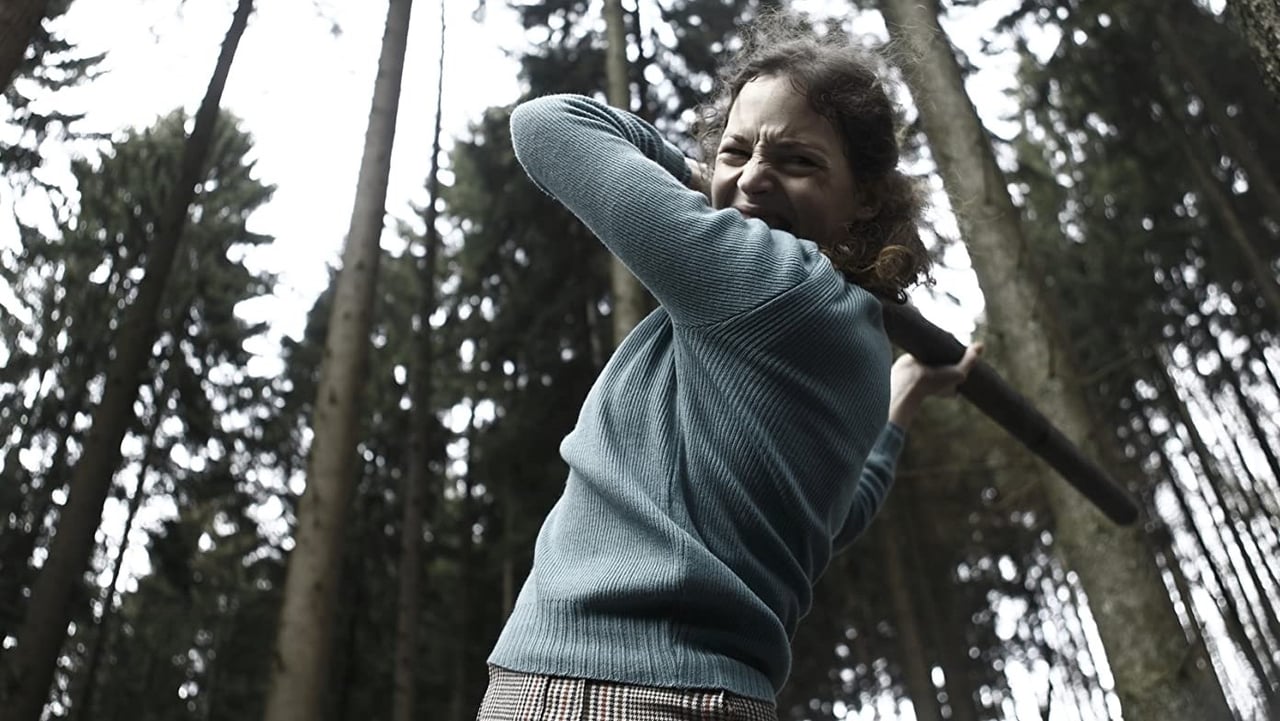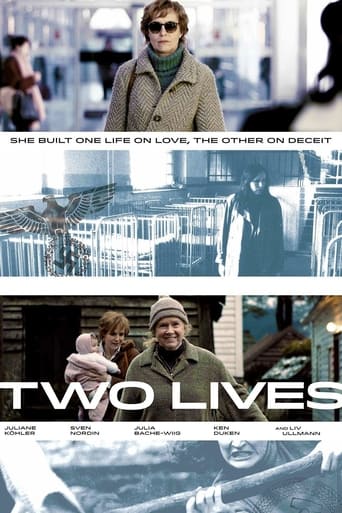

This drama takes place in 1990, shortly after the demolition of the Berlin wall had begun. This was a time when a young Norwegian lawyer felt that there was a good chance of winning a lawsuit against the Norwegian Government for reparations for the children of the Nazi Lebensborn program. Begun in 1935 the goal of the Lebensborn program was to produce more Aryan children for the Third Reich, mainly by way of Nazi leaders producing plentiful offspring. The program was expanded to occupied countries whereby Nazis would mate with with local unmarried women with many, but not all, of the offspring brought back to Germany. The story unfolded in a way to keep my interest. On the one hand Katrine, the main character, is seen as the wife of a Norwegian submarine captain--part of a close, happy family. But early on she is seen on a flight out of the country where she completely transforms her appearance. At that point I was hooked to find out what her story was and I appreciated the slow reveal leading to some intensely dramatic scenes. The story is complicated enough to make it hard to describe without revealing plot details.I had never heard of the Nazi Lebensborn program and this movie shows how focusing on personal experiences can explicate history in a more attention grabbing way than reading a history book. I wish there had been more explanation of the basis for the lawsuit against the Norwegian government. A little research on the topic explains how shabbily, and even cruelly, the Lebensborn children were treated, with the assent of the Norwegian government.All the actors are in fine form--it's good to see that age is not keeping Liv Ullman off the screen.
... View MoreI stumbled across this whilst looking for German language films and although it's mostly in Norwegian, I still had to watch because the plot sounded fascinating.I thought I had it all figured out from the beginning and that I knew exactly how it would end. I was wrong.When dealing with conspiracies and far-fetched seeming events, the best way to go about it is with subtlety and understatement. Juliane Köhler as the lead 'Katrine', manages to portray the urgency, danger and horror of the situation whilst still being sympathetic. I honestly didn't know who to feel most sorry for by the end of it all.The only criticism I have (and hence why not 10/10), is that I would have liked to have seen more of the family and how they subsequently dealt with the tragic revelations.I'm very glad I watched this and it's an easy recommendation from me.9/10
... View MoreThe acting in TWO LIVES is top notch, not to mention the beautiful Liv Ulmann playing-get this-a great-grandmother superbly. The film is based on true events; i.e., the Nazi taking of Nordic infants to replenish Aryan blood with the post-war pack of returned children infiltrated with communist spies. The best scenes are in the middle of the film when we squirm and cringe watching Juliene Krohler struggling to keep her deception afloat. Sven Nodrin is also great as the husband suspending disbelief to keep his marriage afloat. Notwithstanding, the attempts to persuade us to forgive Katrine's deceit arrive too late in the film and the violence at the end, in hindsight, appears unnecessary to achieve TWO LIVES' ends. More tragic effect is actually achieved by the scene of Ullmann's empty eyes staring through the window. I forgive the shortcomings at the end of the movie, however, for the suspense and intrigue generated.
... View MoreGerman screenwriter, film editor and director Georg Maas' second feature film which he co-directed with German screenwriter and cinematographer Judith Kaufmann and co-wrote with her and screenwriters Ståle Stein Nilsen and Christoph Tölle, is inspired by a novel called "Eiszeiten" by German author and journalist Hannelore Hippe. It premiered in Norway, was shot on locations in Norway and Germany and is a Germany-Norway co-production which was produced by producers Dieter Zeppenfeld, Axel Helgeland and Rudi Teichmann. It tells the story about a middle-aged woman named Katrine Myrdal who lives in a house near the coast in Bergen, Norway with her husband named Bjarte whom is in the Navy and their adult daughter named Anne whom is living there with her new-born daughter named Turid. Sometime after receiving a call from her mother named Åse Evensen whom is picked up at her house by Bjarte and Anne and brought to their home, Katrine is contacted by a German attorney named Solbach whom has knowledge about her history and who asks her to testify in a trial against the Norwegian Government. Subtly and engagingly directed by German filmmaker Georg Maas, this finely paced and somewhat fictional tale which is narrated from multiple viewpoints though mostly from the protagonist's point of view, draws a multifaceted and involving portrayal of a Norwegian citizen of German origins whom whilst looking for a nurse named Hiltrud Schlömer who used to work at an orphanage in Sachsenhausen, Germany during the Second World War meets a person who reminds her of her true identity. While notable for its naturalistic and atmospheric milieu depictions, sterling cinematography by German cinematographer Judith Kaufmann and fine production design by production designer Bader El Hindi and costume design by costume designer Ute Paffendorf, this character-driven and narrative-driven about the criminal SS organization called Lebensborn which was founded by the German Reichführer of the Schutzstaffel Heinrich Himmler (1900-1945) in Germany in the mid-1930s for the sake of realizing the Aryan visions of the Austrian-born Chancellor of Germany Adolf Hitler (1889-1945), which was prominent in occupied Norway (1940-1945), which focuses on some of those "many" children who were born, in this particular case, by Norwegian mothers who had been in extramarital relations with German SS members during World War II and the ostracizing treatment of these children and women in post-war Norway, depicts a refined study of character and contains a timely score by composers Christoph M. Kaiser and Julian Maas. This historic, atmospheric, modestly romantic and conversational drama which has been chosen as Germany's official submission to the Academy Award for Best Foreign Language Film at the 86th Academy Awards in 2014, which is set mostly in Norway and Germany in the late 1960s and early 1990s and where a daughter whom is considering to begin studying law meets a man whom is searching for information about her mother and a woman who suffered the consequences of her Nazi countrymen's disgraceful experiments on human lives is reunited with the men who recruited her, is impelled and reinforced by its fragmented narrative structure, substantial character development, efficient continuity, variegated characters, gripping flashback scenes, comment by Bjarte : "What is the truth?", the reverent and understated acting performances by German actress Juliane Köhler, Norwegian actor Sven Nordin, Norwegian actress Julia Bache-Wiig, German actress Klara Manzel and the noteworthy acting performance by Norwegian actress, screenwriter and director Liv Ullmann. An unsettling, heartrending and poignant thriller.
... View More